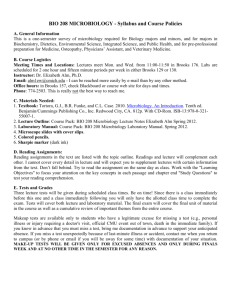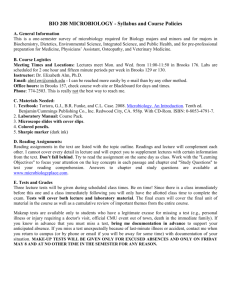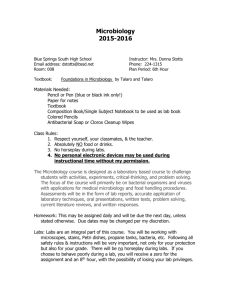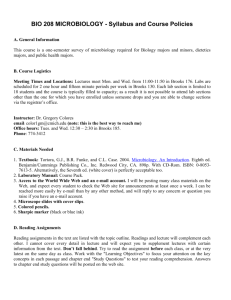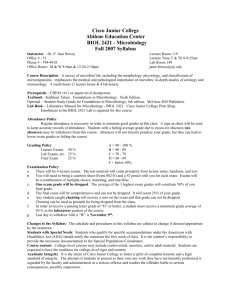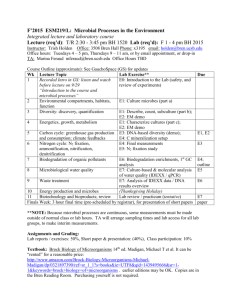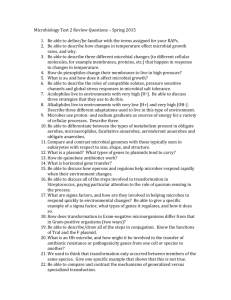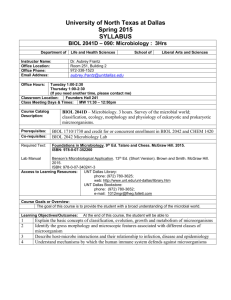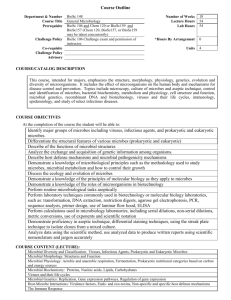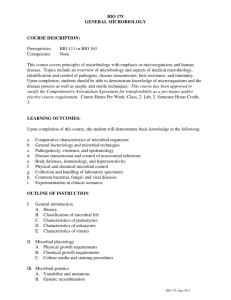BIO 208 MICROBIOLOGY - Syllabus and Course Policies
advertisement
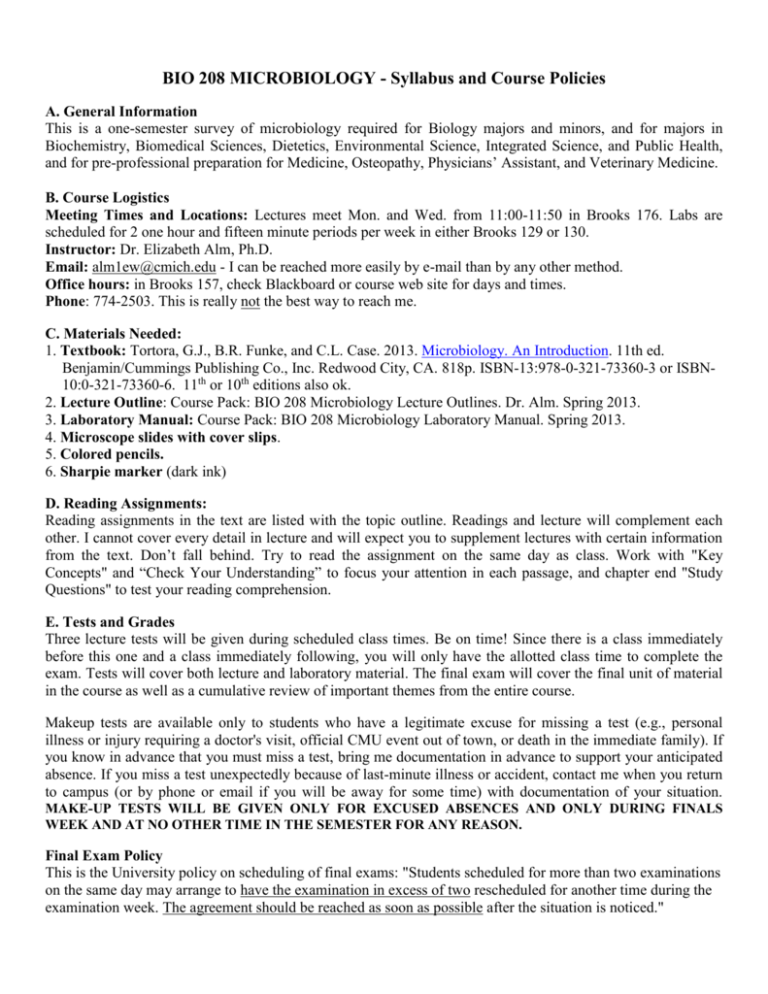
BIO 208 MICROBIOLOGY - Syllabus and Course Policies A. General Information This is a one-semester survey of microbiology required for Biology majors and minors, and for majors in Biochemistry, Biomedical Sciences, Dietetics, Environmental Science, Integrated Science, and Public Health, and for pre-professional preparation for Medicine, Osteopathy, Physicians’ Assistant, and Veterinary Medicine. B. Course Logistics Meeting Times and Locations: Lectures meet Mon. and Wed. from 11:00-11:50 in Brooks 176. Labs are scheduled for 2 one hour and fifteen minute periods per week in either Brooks 129 or 130. Instructor: Dr. Elizabeth Alm, Ph.D. Email: alm1ew@cmich.edu - I can be reached more easily by e-mail than by any other method. Office hours: in Brooks 157, check Blackboard or course web site for days and times. Phone: 774-2503. This is really not the best way to reach me. C. Materials Needed: 1. Textbook: Tortora, G.J., B.R. Funke, and C.L. Case. 2013. Microbiology. An Introduction. 11th ed. Benjamin/Cummings Publishing Co., Inc. Redwood City, CA. 818p. ISBN-13:978-0-321-73360-3 or ISBN10:0-321-73360-6. 11th or 10th editions also ok. 2. Lecture Outline: Course Pack: BIO 208 Microbiology Lecture Outlines. Dr. Alm. Spring 2013. 3. Laboratory Manual: Course Pack: BIO 208 Microbiology Laboratory Manual. Spring 2013. 4. Microscope slides with cover slips. 5. Colored pencils. 6. Sharpie marker (dark ink) D. Reading Assignments: Reading assignments in the text are listed with the topic outline. Readings and lecture will complement each other. I cannot cover every detail in lecture and will expect you to supplement lectures with certain information from the text. Don’t fall behind. Try to read the assignment on the same day as class. Work with "Key Concepts" and “Check Your Understanding” to focus your attention in each passage, and chapter end "Study Questions" to test your reading comprehension. E. Tests and Grades Three lecture tests will be given during scheduled class times. Be on time! Since there is a class immediately before this one and a class immediately following, you will only have the allotted class time to complete the exam. Tests will cover both lecture and laboratory material. The final exam will cover the final unit of material in the course as well as a cumulative review of important themes from the entire course. Makeup tests are available only to students who have a legitimate excuse for missing a test (e.g., personal illness or injury requiring a doctor's visit, official CMU event out of town, or death in the immediate family). If you know in advance that you must miss a test, bring me documentation in advance to support your anticipated absence. If you miss a test unexpectedly because of last-minute illness or accident, contact me when you return to campus (or by phone or email if you will be away for some time) with documentation of your situation. MAKE-UP TESTS WILL BE GIVEN ONLY FOR EXCUSED ABSENCES AND ONLY DURING FINALS WEEK AND AT NO OTHER TIME IN THE SEMESTER FOR ANY REASON. Final Exam Policy This is the University policy on scheduling of final exams: "Students scheduled for more than two examinations on the same day may arrange to have the examination in excess of two rescheduled for another time during the examination week. The agreement should be reached as soon as possible after the situation is noticed." Grading: ***You must pass both the lecture and the lab to pass the course. Lecture 3 Unit Tests Final Exam 450 points 200 points Total Passing requirement 650 points 390 points Lab 17 Lab Reports 5 Lab Quizzes TA subjective assessment Total Passing requirement 240 points 100 points 10 points 350 points 210 points Semester Point Total = 1000 pts Scale for Final Semester Grades: A AB+ B BC+ C CD+ D DE 930+ 900-929 870-899 840-869 800-839 770-799 740-769 700-739 670-699 640-669 600-639 0-599 Extra credit: Extra credit opportunities exist. You can accumulate up to a maximum of 20 points in extra credit. See the course web site or Blackboard for details and schedule. F. Laboratory Laboratory attendance is mandatory! Four unexcused absences in lab will result in a failing grade in the course. The lab schedule lists exercises to be done. You are expected to attend the laboratory section for which you have registered. You should come to lab having read the lab exercise beforehand. You must contact your lab TA prior to an absence if you cannot attend a specific lab. You must bring official documentation if you are missing a lab due to illness or other emergency to facilitate our record keeping and aid in our evaluation. Please do not miss a laboratory unless there is a valid emergency. Any missed lab must be "made up" within 1 week of absence; however, the lab TAs may use their own discretion in allowing make-ups. Failure to follow these guidelines will result in a loss of points for the missed laboratory exercises. G. University Policies Students requiring accommodations CMU provides individuals with disabilities reasonable accommodations to participate in educational programs, activities and services. Students with disabilities requiring accommodations for participation in class activities or meet course requirements should first register with the office of Student Disability Services (250 Foust Hall, telephone #989-774-3018, TDD #2568), and then contact me as early as possible. Policy on academic integrity Copies of the CMU Policy on Academic Integrity are available at http://academicsenate.cmich.edu/noncurric.htm. All academic work is expected to be in compliance with this policy. Classroom civility Each CMU student is encouraged to help create an environment during class that promotes learning, dignity, and mutual respect for everyone. Students who speak at inappropriate times, sleep in class, display inattention, interrupt the class by coming to class late, engage in loud or distracting behaviors, use cell phones in class, use inappropriate language, are verbally abusive, display defiance or disrespect to others, or behave aggressively toward others may be asked to leave the class and subjected to disciplinary action under the Code of Student Rights, Responsibilities and Disciplinary Procedures. For Further Course Details see: http://www.cst.cmich.edu/users/alm1ew/208%20Index%20page.html BIO 208 MICROBIOLOGY - Tentative Schedule for Lecture M 1/7 W 1/9 M 1/14 W 1/16 M 1/21 W 1/23 M 1/28 W 1/30 M 2/4 W 2/6 M 2/11 W 2/13 M 2/18 W 2/20 M 2/25 W 2/27 3/2-3/10 M 3/11 W 3/13 M 3/18 W 3/20 M 3/25 W 3/27 M 4/1 W 4/3 M 4/8 W 4/10 M 4/15 W 4/17 M 4/22 W 4/24 W 5/1 Lecture Topic Unit 1. The Microbial World and You CH 1: What are microbes? What is microbiology? CH 1: How did microbiology become a science? Classification of microbes*/CH 3: How do we see microbes? CH 3: continued/ CH 4: Anatomy of prokaryotic cells** Martin Luther King Jr. Observance – No Classes CH 4: continued CH 4: Origin of eukaryotic cells** End Material For Test 1 Test 1 – Unit 1 Unit 2. How Do Microbes Grow? CH 6: Characteristics of microbial growth CH 6: Effects of the physical environment on microbial growth CH 7: Control of microbial growth* Antibiotic resistance* CH 5: Patterns of metabolism in the microbial world** CH 5: continued CH 5: continued CH 5: continued End Material for Test 2 Test 2 – Unit 2 Spring Break Unit 3. Microbial Genetics and Viruses ** CH 8: Patterns of information flow in the microbial world CH 8: continued CH 8: continued CH 13: Viruses - general characteristics and bacteriophages CH 13: Viruses - animal viruses CH 13: continued End Material for Test 3 Test 3 – Unit 3 Unit 4. Survey - Role of Microbes in Health and Disease CH 27: Microbial water quality* CH 14: Disease transmission and epidemiology** CH 21: Microbial diseases of the skin CH 24: Microbial diseases of the respiratory system CH 26: Microbial STIs CH 22: nervous system; CH 23: cardiovascular/lymphatic system CH 25: Microbial diseases of the digestive system/food poisoning FINAL EXAM - Comprehensive - 10:00-11:50 Brooks 176 Required Reading 11th ed. pp. 1-7; 15-20 pp. 7-14; 406-407 pp. 277-281; 53-64 pp. 75-78; 94-97; 88-93 pp. 84-88; 78-84 p. 105 pp. 160-161; 168-177 pp.154-160 CH 7: entire; pp. 559-564; 579-584 CH 5: entire CH 8: entire pp. 370-373; 381-386 pp. 392-394 pp. 386-392 pp 782-794 CH 14: entire TBA TBA TBA TBA TBA BIO 208 MICROBIOLOGY - Tentative Schedule for Laboratory Date January M,T – 7,8 W,R – 9,10 M,T – 14,15 Lab Activities Unit 1. Microbes Are Everywhere Laboratory Check-in. Start Exercise 1 - Microbes Are All Around Us. Finish Exercise 1. Start Exercise 2 - Making Media. Finish Exercise 2 and turn in Exercises 1 and 2. Start and complete Exercise 3 - Observing Microbes. W,R – 16,17 Quiz 1 Labs 1-4. Exercise 3 due. Start/complete Exercise 4 - Aseptic Technique and Simple Staining. M,T –21,22 W,R – 23,24 M,T – 28,29 Martin Luther King Jr. Holiday – no labs Monday or Tuesday Exercise 4 due. Start Exercise 5 - The Gram Stain Technique. Exercise 5 due. Start and complete Exercise 6 - Acid-Fast and Structural Stains. TAs Exercise 6 but will not collect. All graded exercises will be returned. End Material For Test 1 (covers labs 1-6). W,R – 30,31 February M,T – 4,5 W,R – 6,7 M,T – 11,12 W,R – 13,14 M,T – 18,19 W,R – 20,21 M,T – 25,26 W,R – 27,28 March 3/2-3/10 M,T – 11,12 W,R – 13,14 M,T – 18,19 W,R – 20,21 M,T – 25,26 W,R – 27,28 Unit 2. How Do Microbes Grow? Start Exercise 7 - Culturing Bacteria. Complete and turn in Exercise 7. Start Exercise 8 - Control of Microbial Growth. Complete and turn in Exercise 8. Quiz 2 Labs 5 - 8. Start Exercise 9 - Enzyme Action and Carbohydrate Catabolism. Complete and turn in Exercise 9. Start Exercise 10 - Using Metabolic End Products. Complete and turn in Exercise 10. Start Exercise 11 - Respiration. Complete and turn in Exercise 11. End Material For Test 2 (covers labs 7-11) Start, complete, and turn in Exercise 12 - Autotrophy. Spring Break, no labs Unit 3. Microbial Genetics and Viruses Start and complete Exercise 13 - Isolation of DNA. Start Exercise 14 - Electrophoresis of DNA. Quiz 3 Labs 9-14. Exercise 13 due. Complete Exercise 14. Exercise 14 due. Start Exercise 15 - Transfer of Genetic Information. Complete and turn in Exercise 15. Start Exercise 16 - Bacteriophages. Complete and turn in Exercise 16 (returned W,R). End Material for Test 3 (covers Labs 13-16). W,R – 10,11 M,T – 15,16 W,R – 17,18 M,T – 22,23 Unit 4. Survey of Microbes in Health and Disease Start Exercise 17 - Microbiology and the Food Industry. Complete Exercise 17. Start Exercise 18 - Microbial Ecology and Environmental Microbiology. Continue Exercise 18. Complete and turn in Part I - Microbes in the Soil. Start and Complete Exercise 19 - Disease Transmission. Complete and turn in Exercise 18 Part II – Bacteriological Analysis of Water Quality. Quiz 4 Labs 15-18. Start Exercise 20 - Microbes of the Skin. Ex.17 Part I due. Complete/turn in Exercise 20. Start Exercise 21 - Microbes of the Respiratory Tract. Complete and turn in Exercise 21. Start Exercise 22 - Urinalysis and Microbes of STIs. Quiz 5 labs 19-22. Ex. 22 due. Lab checkout. Pick up graded exercises at your TAs office Fri. Apr. 26. W,R – 24,25 No labs April M,T – 1,2 W,R – 3,4 M,T – 8,9

